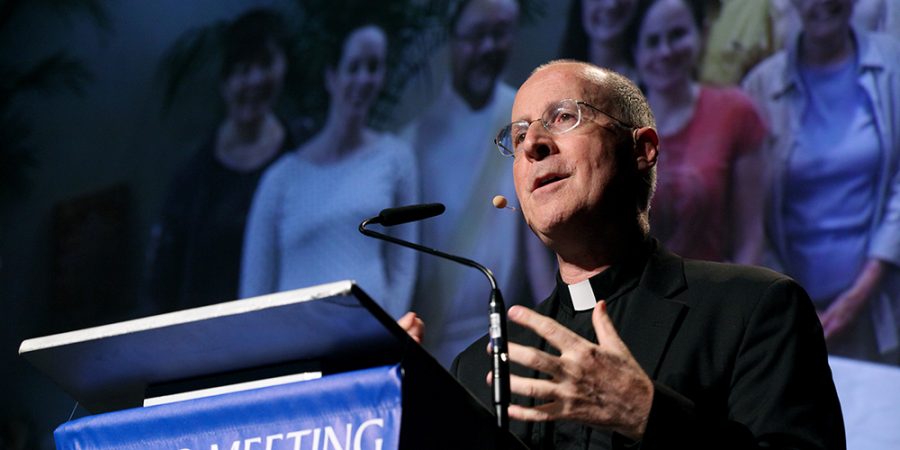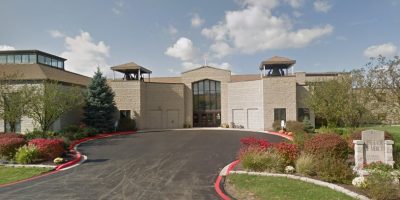The novel coronavirus pandemic strikes at the heart of human behavior...
A conversation with Father James Martin: ‘Why did God let this happen?’

The novel coronavirus pandemic strikes at the heart of human behavior — that of communion and fellowship. The threat is to each other and to our instinct to seek each other out for company during hardship. Depending on your relationship with religion and faith, you may be inclined to seek answers from your guru, demand answers from someone else’s priest, or see suffering as proof of the absence or indifference of God. Whichever way you turn, someone will have an answer. As part of a series where we check in with faith leaders about how the COVID-19 pandemic has shaped faith and worship, we spoke to one of the great friends of the Beliefs podcast, Father James Martin, SJ.
Father Martin wrote a short piece for The New York Times recently called “Where is God in a Pandemic.” We wanted to follow up with Father Martin for his thoughts and advice during this crisis.
We spoke, as everyone must these days, on the phone.
This interview has been edited for length and clarity — find the whole conversation on this week’s episode of the Beliefs podcast.
Father Martin, nice to have you with us again. You recently wrote an article in The New York Times that was titled, “Where Is God in a Pandemic?” And then it had a subtitle: “The honest answer is, we don’t know.” Can you tell us a little of that story?
Father Martin: Well, sure, I probably should have called that piece ‘Why did God let this happen?’ Even believers struggle with it. I tried to explain or at least advance some of the typical arguments; the typical responses. But in the end, the most accurate answer is that we don’t know. The question for believers is: Can you believe in a God that you don’t understand?
Well, that is the big question. For example, during the Ebola crisis, many of the people in areas affected by the disease were saying, “God is punishing us.”
Father Martin: Well, that’s right. That’s a common response. God is doing this because God is punishing us. And you see some of that in the Bible sometimes. But I remind people that, you know, for Christians, certainly Jesus himself rejects that approach.
There’s a story in the Gospels where Jesus meets the person called ‘a man born blind.’ And his disciples say to him bluntly, who sinned — this man or his parents that he was born blind? And Jesus said, ‘No one sinned.’ And elsewhere in the Gospels, he refers to a tower, a stone tower that fell on people and said, you know, do you think those people who were killed were any more sinful than anyone else? He rejects that. And I think we need to reject that … that image of God as punishing people with illness, because that not only blames people for their illness, which is, you know, just the last thing they need, but it also contributes to this image of God as a kind of monster.
When you think about the very difficult times that people are having and through history have had, how has God helped them? How has God helped us in these times right now?
Father Martin: Well, I think that one of the insights is that God is working through us, through individuals. And one of the ways that God works through us is by moving us to compassion. And so, you see it in the compassionate doctors and nurses and health care workers, technicians, you see it. Pope Francis recently talked about the hidden people who are helping, for example, grocery clerks and people who are working in (transportation) … People who are running the subways and the buses and helping us that way. I think one way that God works is by moving people’s hearts and moving them to be compassionate and moving them to help people. That’s where I think we can see God in the crisis. We can see it in the loving, merciful and compassionate responses of people around us.
You have a unique position, not only being a well-known Catholic priest but also in close relationship with the Holy Father, Pope Francis. He seems as though he has been treating this worldwide crisis with great care and insight. Would you care to talk about that a bit?
I think the pope has been acting like the world’s pastor in the absence of so many people being able to go to mass. I think they can look to him. And frankly, I don’t think he’s put a foot wrong in terms of his pastoral outreach during this crisis. And I thought especially his prayer the other day in Vatican City in front of an empty St. Peter’s Square, where he invited us to look at the Gospel reading, where the disciples are in the midst of a storm at sea and are worried and feel that Jesus has abandoned them, was masterful. He talked about Jesus being there and inviting Jesus into our boats. I thought it was a great image that he used. So, I think he’s been doing a great job, and I myself am moved by his witness and his words.
Can any good come of this?
Father James Martin: Well, I think that, as Pope Francis said in his remarks, it’s reminding us what’s important. He said it’s not God’s judgment on us. It’s to judge what’s important for us. I mean, family, friends, life, taking care of one another. It really strips everything away and reminds us to just focus on things that are important. And I don’t think, again, that that’s why these things are happening. It’s not the why of suffering. But it is the fact of suffering. It’s part of what happens when you suffer, which is you see things in a new perspective.
I think that’s one thing that the pandemic is inviting us all to do, which is to see things in a new way.
Father Jim Martin, thank you for all this and stay healthy.
Father Martin: Thank you. You too.
Read more news at XPian News… https://xpian.news



Comments are Closed